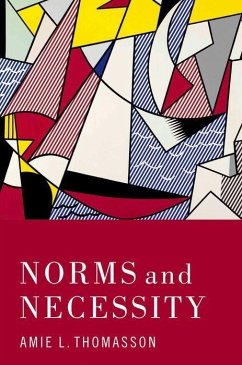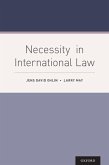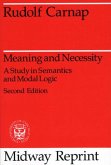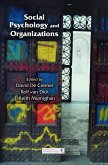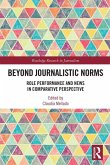Amie Thomasson (Dartmouth College )
Norms and Necessity
Amie Thomasson (Dartmouth College )
Norms and Necessity
- Broschiertes Buch
- Merkliste
- Auf die Merkliste
- Bewerten Bewerten
- Teilen
- Produkt teilen
- Produkterinnerung
- Produkterinnerung
Philosophical theories often hinge on claims about what is necessary or possible. But what are possibilities and necessities, and how could we come to know about them? This book aims to help demystify the methodology of philosophy, by treating such claims not as attempted descriptions of strange facts or distant 'possible worlds', but rather as ways of expressing rules or norms.
Andere Kunden interessierten sich auch für
![WHEN NORMS COLLIDE P WHEN NORMS COLLIDE P]() Karisa Cloward (Assistant Assistant Professor of Political ScienceWHEN NORMS COLLIDE P48,99 €
Karisa Cloward (Assistant Assistant Professor of Political ScienceWHEN NORMS COLLIDE P48,99 €![Necessity in International Law Necessity in International Law]() Jens David Ohlin (Professor of Associate Dean for Academic AffairsNecessity in International Law180,99 €
Jens David Ohlin (Professor of Associate Dean for Academic AffairsNecessity in International Law180,99 €![Meaning and Necessity Meaning and Necessity]() Rudolf CarnapMeaning and Necessity42,99 €
Rudolf CarnapMeaning and Necessity42,99 €![The Necessity of Social Control The Necessity of Social Control]() Istvan MeszarosThe Necessity of Social Control27,99 €
Istvan MeszarosThe Necessity of Social Control27,99 €![Social Psychology and Organizations Social Psychology and Organizations]() Social Psychology and Organizations84,99 €
Social Psychology and Organizations84,99 €![Beyond Journalistic Norms Beyond Journalistic Norms]() Beyond Journalistic Norms36,99 €
Beyond Journalistic Norms36,99 €![Transplanted by Necessity Transplanted by Necessity]() Hilda CreasyTransplanted by Necessity17,99 €
Hilda CreasyTransplanted by Necessity17,99 €-
-
-
Philosophical theories often hinge on claims about what is necessary or possible. But what are possibilities and necessities, and how could we come to know about them? This book aims to help demystify the methodology of philosophy, by treating such claims not as attempted descriptions of strange facts or distant 'possible worlds', but rather as ways of expressing rules or norms.
Hinweis: Dieser Artikel kann nur an eine deutsche Lieferadresse ausgeliefert werden.
Hinweis: Dieser Artikel kann nur an eine deutsche Lieferadresse ausgeliefert werden.
Produktdetails
- Produktdetails
- Verlag: Oxford University Press Inc
- Seitenzahl: 248
- Erscheinungstermin: 7. November 2023
- Englisch
- Abmessung: 202mm x 139mm x 17mm
- Gewicht: 288g
- ISBN-13: 9780197747162
- ISBN-10: 0197747167
- Artikelnr.: 67732662
- Herstellerkennzeichnung
- Libri GmbH
- Europaallee 1
- 36244 Bad Hersfeld
- 06621 890
- Verlag: Oxford University Press Inc
- Seitenzahl: 248
- Erscheinungstermin: 7. November 2023
- Englisch
- Abmessung: 202mm x 139mm x 17mm
- Gewicht: 288g
- ISBN-13: 9780197747162
- ISBN-10: 0197747167
- Artikelnr.: 67732662
- Herstellerkennzeichnung
- Libri GmbH
- Europaallee 1
- 36244 Bad Hersfeld
- 06621 890
Amie L. Thomasson is the Daniel P. Stone Professor of Intellectual and Moral Philosophy at Dartmouth College. She is the author of Ontology Made Easy (Oxford University Press, 2015), Ordinary Objects (Oxford University Press, 2007), and Fiction and Metaphysics (Cambridge University Press, 1999), and co-editor (with David W. Smith) of Phenomenology and Philosophy of Mind (Oxford University Press, 2005). Her book Ontology Made Easy was awarded the American Philosophical Association's 2017 Sanders Book Prize. She has also published more than 70 book chapters and articles on topics in metaphysics, metaontology, fiction, philosophy of mind and phenomenology, the philosophy of art, and social ontology. She has twice held Fellowships with the National Endowment for the Humanities.
Acknowledgements
Introduction
1. The Rise and Fall of Early Non-Descriptive Approaches
1.1 The Pre-History: Challenges for Empiricism
1.2 Conventionalism and its Motives
1.3 Criticisms of Conventionalism
1.4 Later Non-Descriptivism and the Normative Function of Modal Discourse
1.5 Why the Non-Descriptivist Approach was Lost
1.6 New Barriers to Modal Non-Descriptivism
1.7 A Non-Descriptivist Revival
1.8 Where Do We Go From Here?
2. The Function of Modal Discourse
2.1 Games, Necessities and the Advantages of Modal Terminology
2.2 The Function of Metaphysical Modal Terminology
2.3 Uses of Metaphysical Modal Claims
2.4 How Should We Understand the Semantic Rules?
3. The Meaning of Modal Discourse
3.1 The Relation between Function and Use
3.2 The Content of Modal Terms
3.3 Modal Propositions and Modal Truth
3.4 Avoiding the Criticisms of Conventionalism
3.5 Conclusion
4. Handling De Re and A Posteriori Modal Claims
4.1 Rules for Names and Natural Kind Terms
4.2 De Re Modal Claims
4.3 A Posteriori Modal Claims
4.4 The Contingent A Priori
4.5 Conclusion
5. Other Objections to Modal Normativism
5.1 Putative Counter-examples
5.2 Circularity Worries
5.3 Does it Rely on a Heavyweight Understanding of Logical Necessity?
5.4 Conclusion
6. Ontological Advantages
6.1 Modal Facts and Properties
6.2 Possible Worlds
6.3 What we Gain
6.4 Classificatory (and other forms of) Conventionalism
7. Epistemological Advantages
7.1 The Integration Challenge
7.2 The Reliability Challenge
7.3 Meeting the Integration Challenge
7.4 Meeting the Reliability Challenge
7.5 Does the Challenge Rise Again?
7.6 The Unexplained Coincidence Problem
7.7 Conclusion
8. Methodological Advantages
8.1 Justifying the use of Intuition in Metaphysical Modal Debates
8.2 A Defense of the Relevance of Traditional Methods
8.3 Resolving Internal Metaphysical Modal Disputes
8.4 Objections to Conceptual Analysis
8.5 Limits to Detail and Precision
8.6 Understanding External Metaphysical Modal Disputes
8.7 Conclusion
Conclusion
Introduction
1. The Rise and Fall of Early Non-Descriptive Approaches
1.1 The Pre-History: Challenges for Empiricism
1.2 Conventionalism and its Motives
1.3 Criticisms of Conventionalism
1.4 Later Non-Descriptivism and the Normative Function of Modal Discourse
1.5 Why the Non-Descriptivist Approach was Lost
1.6 New Barriers to Modal Non-Descriptivism
1.7 A Non-Descriptivist Revival
1.8 Where Do We Go From Here?
2. The Function of Modal Discourse
2.1 Games, Necessities and the Advantages of Modal Terminology
2.2 The Function of Metaphysical Modal Terminology
2.3 Uses of Metaphysical Modal Claims
2.4 How Should We Understand the Semantic Rules?
3. The Meaning of Modal Discourse
3.1 The Relation between Function and Use
3.2 The Content of Modal Terms
3.3 Modal Propositions and Modal Truth
3.4 Avoiding the Criticisms of Conventionalism
3.5 Conclusion
4. Handling De Re and A Posteriori Modal Claims
4.1 Rules for Names and Natural Kind Terms
4.2 De Re Modal Claims
4.3 A Posteriori Modal Claims
4.4 The Contingent A Priori
4.5 Conclusion
5. Other Objections to Modal Normativism
5.1 Putative Counter-examples
5.2 Circularity Worries
5.3 Does it Rely on a Heavyweight Understanding of Logical Necessity?
5.4 Conclusion
6. Ontological Advantages
6.1 Modal Facts and Properties
6.2 Possible Worlds
6.3 What we Gain
6.4 Classificatory (and other forms of) Conventionalism
7. Epistemological Advantages
7.1 The Integration Challenge
7.2 The Reliability Challenge
7.3 Meeting the Integration Challenge
7.4 Meeting the Reliability Challenge
7.5 Does the Challenge Rise Again?
7.6 The Unexplained Coincidence Problem
7.7 Conclusion
8. Methodological Advantages
8.1 Justifying the use of Intuition in Metaphysical Modal Debates
8.2 A Defense of the Relevance of Traditional Methods
8.3 Resolving Internal Metaphysical Modal Disputes
8.4 Objections to Conceptual Analysis
8.5 Limits to Detail and Precision
8.6 Understanding External Metaphysical Modal Disputes
8.7 Conclusion
Conclusion
Acknowledgements
Introduction
1. The Rise and Fall of Early Non-Descriptive Approaches
1.1 The Pre-History: Challenges for Empiricism
1.2 Conventionalism and its Motives
1.3 Criticisms of Conventionalism
1.4 Later Non-Descriptivism and the Normative Function of Modal Discourse
1.5 Why the Non-Descriptivist Approach was Lost
1.6 New Barriers to Modal Non-Descriptivism
1.7 A Non-Descriptivist Revival
1.8 Where Do We Go From Here?
2. The Function of Modal Discourse
2.1 Games, Necessities and the Advantages of Modal Terminology
2.2 The Function of Metaphysical Modal Terminology
2.3 Uses of Metaphysical Modal Claims
2.4 How Should We Understand the Semantic Rules?
3. The Meaning of Modal Discourse
3.1 The Relation between Function and Use
3.2 The Content of Modal Terms
3.3 Modal Propositions and Modal Truth
3.4 Avoiding the Criticisms of Conventionalism
3.5 Conclusion
4. Handling De Re and A Posteriori Modal Claims
4.1 Rules for Names and Natural Kind Terms
4.2 De Re Modal Claims
4.3 A Posteriori Modal Claims
4.4 The Contingent A Priori
4.5 Conclusion
5. Other Objections to Modal Normativism
5.1 Putative Counter-examples
5.2 Circularity Worries
5.3 Does it Rely on a Heavyweight Understanding of Logical Necessity?
5.4 Conclusion
6. Ontological Advantages
6.1 Modal Facts and Properties
6.2 Possible Worlds
6.3 What we Gain
6.4 Classificatory (and other forms of) Conventionalism
7. Epistemological Advantages
7.1 The Integration Challenge
7.2 The Reliability Challenge
7.3 Meeting the Integration Challenge
7.4 Meeting the Reliability Challenge
7.5 Does the Challenge Rise Again?
7.6 The Unexplained Coincidence Problem
7.7 Conclusion
8. Methodological Advantages
8.1 Justifying the use of Intuition in Metaphysical Modal Debates
8.2 A Defense of the Relevance of Traditional Methods
8.3 Resolving Internal Metaphysical Modal Disputes
8.4 Objections to Conceptual Analysis
8.5 Limits to Detail and Precision
8.6 Understanding External Metaphysical Modal Disputes
8.7 Conclusion
Conclusion
Introduction
1. The Rise and Fall of Early Non-Descriptive Approaches
1.1 The Pre-History: Challenges for Empiricism
1.2 Conventionalism and its Motives
1.3 Criticisms of Conventionalism
1.4 Later Non-Descriptivism and the Normative Function of Modal Discourse
1.5 Why the Non-Descriptivist Approach was Lost
1.6 New Barriers to Modal Non-Descriptivism
1.7 A Non-Descriptivist Revival
1.8 Where Do We Go From Here?
2. The Function of Modal Discourse
2.1 Games, Necessities and the Advantages of Modal Terminology
2.2 The Function of Metaphysical Modal Terminology
2.3 Uses of Metaphysical Modal Claims
2.4 How Should We Understand the Semantic Rules?
3. The Meaning of Modal Discourse
3.1 The Relation between Function and Use
3.2 The Content of Modal Terms
3.3 Modal Propositions and Modal Truth
3.4 Avoiding the Criticisms of Conventionalism
3.5 Conclusion
4. Handling De Re and A Posteriori Modal Claims
4.1 Rules for Names and Natural Kind Terms
4.2 De Re Modal Claims
4.3 A Posteriori Modal Claims
4.4 The Contingent A Priori
4.5 Conclusion
5. Other Objections to Modal Normativism
5.1 Putative Counter-examples
5.2 Circularity Worries
5.3 Does it Rely on a Heavyweight Understanding of Logical Necessity?
5.4 Conclusion
6. Ontological Advantages
6.1 Modal Facts and Properties
6.2 Possible Worlds
6.3 What we Gain
6.4 Classificatory (and other forms of) Conventionalism
7. Epistemological Advantages
7.1 The Integration Challenge
7.2 The Reliability Challenge
7.3 Meeting the Integration Challenge
7.4 Meeting the Reliability Challenge
7.5 Does the Challenge Rise Again?
7.6 The Unexplained Coincidence Problem
7.7 Conclusion
8. Methodological Advantages
8.1 Justifying the use of Intuition in Metaphysical Modal Debates
8.2 A Defense of the Relevance of Traditional Methods
8.3 Resolving Internal Metaphysical Modal Disputes
8.4 Objections to Conceptual Analysis
8.5 Limits to Detail and Precision
8.6 Understanding External Metaphysical Modal Disputes
8.7 Conclusion
Conclusion

